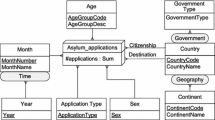Abstract
The SPARQL 1.1 standard has made it possible to formulate analytical queries in SPARQL. While some approaches have become available for processing analytical queries on RDF data cubes, little attention has been paid to answering provenance-enabled queries over such data. Yet, considering provenance is a prerequisite to being able to validate if a query result is trustworthy. The main challenge for existing triple stores is the way provenance can be encoded in standard triple stores based on context values (named graphs). Hence, in this paper we analyze the suitability of existing triple stores for answering provenance-enabled queries on RDF data cubes, identify their shortcomings, and propose an index to handle the high number of context values that provenance encoding typically entails. Our experimental results using the Star Schema Benchmark show the feasibility and scalability of our index and query evaluation strategies.
Access this chapter
Tax calculation will be finalised at checkout
Purchases are for personal use only
Similar content being viewed by others
References
Abelló, A., Romero, O., Pedersen, T.B., Berlanga, R., Nebot, V., Aramburu, M.J., Simitsis, A.: Using semantic web technologies for exploratory OLAP: a survey. TKDE 27(2), 571–588 (2015)
Apache software foundation. Jena TDB (3.1.0). https://jena.apache.org/
Bog, A., Plattner, H., Zeier, A.: A mixed transaction processing and operational reporting benchmark. ISF 13(3), 321–335 (2011)
Chebotko, A., Abraham, J., Brazier, P., Piazza, A., Kashlev, A., Lu, S.: Storing, indexing and querying large provenance data sets as RDF graphs in apache HBase. In: Services, pp. 1–8 (2013)
Chebotko, A., Lu, S., Fei, X., Fotouhi, F.: RDFProv: a relational RDF store for querying and managing scientific workflow provenance. DKE 69(8), 836–865 (2010)
Cyganiak, R., Reynolds, D.: The RDF data cube vocabulary. W3C recommendation, W3C, January 2014. http://www.w3.org/TR/2014/REC-vocab-data-cube-20140116/
Deb Nath, R.P., Hose, K., Pedersen, T.B.: Towards a programmable semantic extract-transform-load framework for semantic data warehouses. In: DOLAP, pp. 15–24 (2015)
Eclipse RDF4J. RDF4J (2.0.1). http://rdf4j.org/
Etcheverry, L., Vaisman, A., Zimányi, E.: Modeling and querying data warehouses on the semantic web using QB4OLAP. In: Bellatreche, L., Mohania, M.K. (eds.) DaWaK 2014. LNCS, vol. 8646, pp. 45–56. Springer, Heidelberg (2014). doi:10.1007/978-3-319-10160-6_5
Flouris, G., Fundulaki, I., Pediaditis, P., Theoharis, Y., Christophides, V.: Coloring RDF triples to capture provenance. In: Bernstein, A., Karger, D.R., Heath, T., Feigenbaum, L., Maynard, D., Motta, E., Thirunarayan, K. (eds.) ISWC 2009. LNCS, vol. 5823, pp. 196–212. Springer, Heidelberg (2009). doi:10.1007/978-3-642-04930-9_13
Gür, N., Hose, K., Pedersen, T.B., Zimányi, E.: Modeling and querying spatial data warehouses on the semantic web. In: Qi, G., Kozaki, K., Pan, J.Z., Yu, S. (eds.) JIST 2015. LNCS, vol. 9544, pp. 3–22. Springer, Heidelberg (2016). doi:10.1007/978-3-319-31676-5_1
Harris, S., Seaborne, A.: SPARQL 1.1 query language. W3C recommendation, W3C, March 2013. http://www.w3.org/TR/2013/REC-sparql11-query-20130321/
Hartig, O., Thompson, B.: Foundations of an alternative approach to reification in RDF (2014). CoRR abs/1406.3399
Ibragimov, D., Hose, K., Pedersen, T.B., Zimányi, E.: Towards exploratory OLAP over linked open data - a case study. In: BIRTE, pp. 1–18 (2014)
Ibragimov, D., Hose, K., Pedersen, T.B., Zimányi, E.: Processing aggregate queries in a federation of SPARQL endpoints. In: Gandon, F., Sabou, M., Sack, H., d’Amato, C., Cudré-Mauroux, P., Zimmermann, A. (eds.) ESWC 2015. LNCS, vol. 9088, pp. 269–285. Springer, Heidelberg (2015). doi:10.1007/978-3-319-18818-8_17
Jakobsen, K.A., Andersen, A.B., Hose, K., Pedersen, T.B.: Optimizing RDF data cubes for efficient processing of analytical queries. In: COLD (2015)
Jensen, C.S., Pedersen, T.B., Thomsen, C.: Multidimensional Databases and Data Warehousing. Synthesis Lectures on Data Management. Morgan & Claypool Publishers, San Rafael (2010)
Jovanovic, P., Romero, O., Simitsis, A., Abelló, A.: ORE: an iterative approach to the design and evolution of multi-dimensional schemas. In: DOLAP, pp. 1–8 (2012)
Laborie, S., Ravat, F., Song, J., Teste, O.: Combining business intelligence with semantic web: overview and challenges. In: INFORSID, pp. 99–114 (2015)
McGuinness, D., Lebo, T., Sahoo, S.: PROV-o: The PROV ontology. W3C recommendation, W3C, April 2013. http://www.w3.org/TR/2013/REC-prov-o-20130430/
O’Neil, P., O’Neil, B., Chen, X.: Star schema benchmark. Technical report, UMass/Boston, June 2019. http://www.cs.umb.edu/~poneil/StarSchemaB.PDF
Wang, H., Wu, T., Qi, G., Ruan, T.: On publishing Chinese linked open schema. In: Mika, P., Tudorache, T., Bernstein, A., Welty, C., Knoblock, C., Vrandečić, D., Groth, P., Noy, N., Janowicz, K., Goble, C. (eds.) ISWC 2014. LNCS, vol. 8796, pp. 293–308. Springer, Heidelberg (2014). doi:10.1007/978-3-319-11964-9_19
Wylot, M., Cudre-Mauroux, P., Groth, P.: TripleProv: efficient processing of lineage queries in a native RDF store. In: WWW, pp. 455–466 (2014)
Wylot, M., Cudre-Mauroux, P., Groth, P.: Executing provenance-enabled queries over web data. In: WWW, pp. 1275–1285 (2015)
Acknowledgments
This research was partially funded by the Danish Council for Independent Research (DFF) under grant agreement No. DFF-4093-00301.
Author information
Authors and Affiliations
Corresponding author
Editor information
Editors and Affiliations
Rights and permissions
Copyright information
© 2016 Springer International Publishing AG
About this paper
Cite this paper
Ahlstrøm, K., Hose, K., Pedersen, T.B. (2016). Towards Answering Provenance-Enabled SPARQL Queries Over RDF Data Cubes. In: Li, YF., et al. Semantic Technology. JIST 2016. Lecture Notes in Computer Science(), vol 10055. Springer, Cham. https://doi.org/10.1007/978-3-319-50112-3_14
Download citation
DOI: https://doi.org/10.1007/978-3-319-50112-3_14
Published:
Publisher Name: Springer, Cham
Print ISBN: 978-3-319-50111-6
Online ISBN: 978-3-319-50112-3
eBook Packages: Computer ScienceComputer Science (R0)




